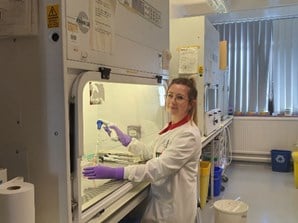Fiona Want

Fiona Want is a third-year PhD student in the Target Evaluation and Molecular Therapeutics team at the ICR. Her project focuses on the role of two APOBEC3 proteins in bladder cancer, investigating why they are hijacked and how their activity may contribute to the emergence of drug resistance.
What is your educational/work background?
Before starting my PhD, I completed an MSci undergraduate degree in genetics at the University of Nottingham. During that time, I carried out a project investigating movement in predatory bacteria, Bdellovirbrio.
Why did you want to study at the ICR?
I was particularly drawn to studying at the ICR as it is a world-leader in cancer research offering the unique opportunity to work as part of a multidisciplinary team combining mechanistic biology and drug discovery.
The ICR and Imperial College London are pleased to announce that funding is available for our non-clinical Convergence Science PhD Programme. Studentships will be for four years commencing in October 2020. Applications for our cross-institutional PhD studentships are open until 11.55pm (UK time) Friday 22 November.
Apply now
Talk us through your typical day
On a typical day (pre-COVID!), I would spend most of my day in the lab doing a mixture of tissue culture and molecular biology. But I would always make time for tea breaks in the office to catch up with my colleagues and have interesting, impromptu scientific discussions as well. However, as you can imagine my day has changed a lot lately! Due to COVID restrictions, my typical day now starts (very early) with a morning shift in the lab followed by analysing data and planning experiments at home in the afternoon. It has certainly been an adjustment and I really miss my teammates who are on the afternoon lab shift as I haven’t seen most of them properly since before lockdown!
What big projects are you working on?
APOBEC proteins have a key role in the immune system, helping to fend off viruses by damaging their DNA. However, recent data has shown that APOBECs can be hijacked by cancers, potentially helping to speed up their evolution and to develop drug resistance. My job is to understand the role of APOBEC proteins in bladder cancer. It’s particularly exciting to be part of a team working on a new class of drug that could specifically target cancer’s ability to evolve.
What are you most proud of?
My PhD journey has been a little challenging at times. Last year I broke my leg and ended up having to take a four-month interruption to my studies to recover. Just after returning to the lab full time, lockdown started! I am proud that despite all this, I have never given up, am still pushing forward with my project. During lockdown, I won first prize for my virtual student poster at the ICR conference!
How do you take part in life at the ICR outside your studies?
I’ve been on the Student Committee since my first year and I’m currently Vice President for the Sutton site. It’s great being part of something that ensures students' voices are heard. I am also a Student Wellbeing Advisor which involves being an informal point of call for students, offering support and guidance with any concerns they have.
What opportunities has studying at the ICR given you?
Studying here has offered me so many opportunities; I have attended conferences, get to regularly present my work and help contribute to the student experience through the Student Committee. I am always pushed to do the best that I can and believe my time here will prepare me well for my future career.
What’s your favourite part of life at the ICR?
Being part of such a great team; everyone is so friendly and supportive. If there is a technique you want to learn or a problem you need help troubleshooting, there is always someone in the institute with the expertise willing to help you.
What do you do to wind down?
I enjoy listening to music, baking and going for walks in the countryside with my other half. Much to my supervisor’s dismay (as it’s how I broke my leg….), horse riding is still my passion and I will go any time I can!